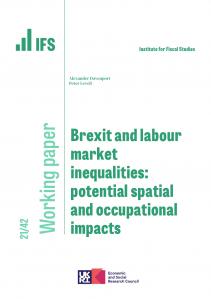This article was originally published on The MJ and is reproduced here with full permission.
The last time the government updated its assessment of what different councils in England need to spend was in 2013. And since 2016, the cuts the government has been making to the grants it gives to councils have taken into account the council tax revenues they raised in 2015-16. This has left things in need of reform – we cannot end up with a local government finance system where funding in the 2020s and 2030s simply depends on the distribution of grants and council tax revenues in the mid 2010s.
It’s in this context that the government is undertaking the Fair Funding Review. This is aimed at coming up with a new system for allocating funding to councils based on updated and improved methods for estimating their differing spending needs and differing abilities to raise revenues via council tax and business rates. Two new reports from the IFS look at some of the key issues that will arise in this undertaking.
The Review will have to address some big picture questions about our priorities as a country. One such question is how to trade-off two worthy aims: the redistribution of funding across England to help ensure all councils can provide local services to a comparable standard; and the provision of financial incentives to councils to tackle the drivers of spending needs and boost local tax bases.
The more funding allocations take account of differences in spending needs and revenue-raising capacities, and the more frequently the assessments of these are updated, the easier it will be to ensure comparable service standards across the country. However, councils will then have less direct financial incentive to tackle deprivation and ill-health or to boost household incomes and property development. That’s because a larger share of any reductions in spending need or increases in local tax revenues would be offset by cuts in grants or transfers from other councils. Conversely, increases to grants/transfers would insulate councils from increases in their relative spending needs or falls in their revenue-raising capacities.
Discussions between councils and the government suggest a preference for taking some but not full account of changes in relative spending needs and revenue-raising capacities when ‘resetting’ funding allocations every few years. But how partial is a ‘partial reset’? Offsetting 50% of these changes? Or 75%? Or some other percentage? Precise details will matter and could mean millions more or less funding for different councils. Modelling will need to be done to examine the potential impacts of different choices. But in doing this the government should not forget the principles of what it is trying to achieve: whether that is to focus more on redistribution or incentives.
Different governments might also have different views about how redistributive the funding system should be – so the system should have the flexibility for this to be changed. In designing such a system, it will be important to avoid making the same mistakes that led to the Four Block Model. That gave Ministers significant discretion about how redistributive the system was. But the model was so complex that it was almost impossible to work out what choices the government was making. This allowed Ministers to claim they were taking ‘unprecedented steps’ to protect the councils most reliant on central government grants from post-2010 funding costs, when they were in fact using the funding system’s flexibilities to reduce the degree of redistribution, thereby making much larger-than-average cuts to such councils’ overall funding levels. The new funding system can and should be more transparent, as our reports explain.
A transparent system should also make it easier to work out whether the government is fudging the Review to avoid the political pain that could result from what may be big reductions (as well as big increases) in funding for some councils.
In particular, our analysis suggests that some inner London councils could see pretty big reductions in funding following the review. For instance, Westminster is currently assessed to need to spend 2.5 times the average per person on environmental, protective and cultural services. However, our analysis suggests updated spending needs formulas based on the latest data could lead to a figure more like 1.25 times the average – a fall of 50%. Westminster also has the lowest council tax rate in the country and so would lose out if the new system reverts to taking account of councils’ revenue-raising capacities rather than their actual tax revenues, as seems likely.
This could mean cuts of many millions of pounds to a council like Westminster’s budget. The government might want to phase this in slowly or even insulate councils from the full force of such changes indefinitely. That wouldn’t necessarily be wrong but it is something the government should be up front about. Money used to insulate councils experiencing large reductions in funding could otherwise flow to other councils, including those currently receiving less funding than the new assessments suggest they should.
Ultimately, it’s unlikely the Review will result in a distribution of funding deemed ‘fair’ by everyone. But it could lead to a system that is more transparent about what the government is trying to achieve and is much clearer about the impacts of the government’s decisions on different councils. That in itself would be fairer than the current position.








